Saffron is a spice that’s been used for centuries that also has potent effects as an antidepressant, a treatment for sexual dysfunction, and powerful antioxidant effects.
Its also found in many appetite suppressants and weight loss pills.
Famed for being difficult to grow and time-consuming to harvest, saffron has emerged recently as a promising supplement that has a broad range of benefits supported in clinical trials.
If you want to fight off depression, battle back against sexual dysfunction, maintain cognitive function in old age, or just improve your antioxidant status, saffron might be the right supplement for you.
We’ve reviewed the science and ranked the ten best saffron supplements on the market.
Research
Rankings
1. Saffron Super Spice + by Nuzena
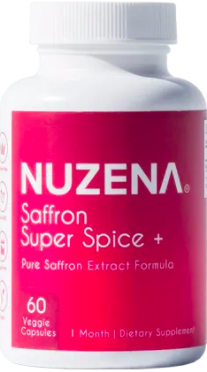
Click here for the lowest price
Nuzena is a new, premium supplement line famous for its potent concentrations.
Saffron Super Spice + offers a pure extract form of Saffron with each capsule containing 88.5mg of the coveted spice.
While we have seen similar dosages in other Saffron supplements, what we like about Nuzena the most and what sets them apart is their reputation for going the extra mile when ensuring supplement quality.
Saffron Super Spice + takes our #1 pick for the best Saffron supplement here.
Click here for the lowest price
2. Life Extension Optimized Saffron
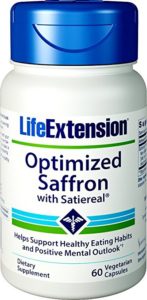
Life Extension Optimized Saffron is one of the best pure saffron supplements out there thanks to its standardized dose, strong reputation, and purity of the saffron used in manufacturing.
It’s standardized to contain 0.3% safranal per vegetarian-friendly capsule, which contains 88.25 mg of saffron extract total.
3. Genius Diet Pills
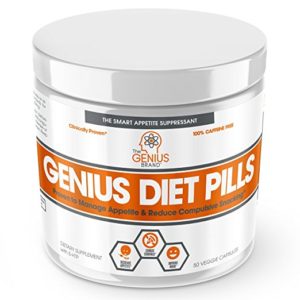
While saffron’s benefits extend far beyond weight loss, Genius has harnessed the power of saffron along with the neurotransmitter precursor 5-HTP to modulate your brain’s appetite sensations.
This combination appears to be far more effective than saffron alone in battling hunger cravings during the day.
4. Double Wood Supplements Saffron Extract
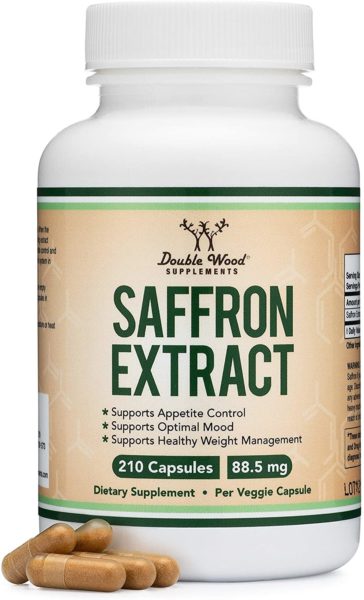
Double Wood is a newer entry to our rankings, and although its formulation isn’t anything special, it does offer two attractive features: first, supplying a large bottle with 210 capsules, and second, packaging the saffron powder into vegan-friendly capsules. For purists who are going to be taking higher doses of saffron, it’s a good option.
5. Bio Nutrition Saffron Extract
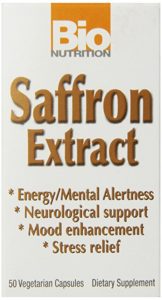
Bio Nutrition goes an extra step to make sure that their saffron extract (the usual 88.5 mg dose per capsule) is standardized to contain 0.3 mg of safranal, which is one of the ingredients though to be important in the biological effects of saffron.
While this is good to see, don’t make the mistake of thinking that saffron is the only important compound. Saffron, like many other plant-derived supplements, likely relies on the interplay between several different molecules in the plant material.
6. Mother Nutrient Saffron Extract
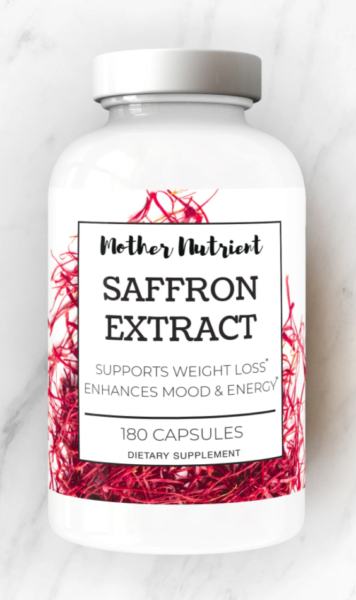
Mother Nutrient Saffron Extract makes a simple and straightforward saffron extract that’s got 88.5 mg of saffron extract in a vegan-friendly cellulose capsule. It has good manufacturing practice certification; the only downside is the inclusion of silica as an anti-caking agent.
7. iPro Organic Supplements Saffron Extract
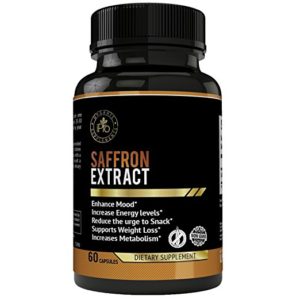
iPro Organic Supplements offers a saffron supplement that contains 88.5 mg of saffron per cellulose-based capsule.
It’s a solid choice, as it only uses rice flour as a binder and doesn’t have any other extraneous ingredients.
8. 1 Body Saffron 8825
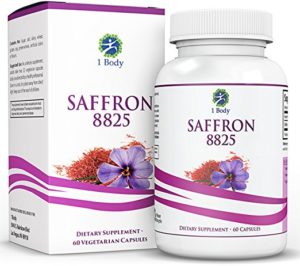
1 Body makes a saffron supplement that’s somewhat lower in the concentration of the active ingredients than its competitors.
Though it too contains 88.25 mg of saffron per capsule, it’s only standardized to a 0.1% saffron extract versus the 0.3% of many of the other saffron supplements out there.
9. Lean Nutraceuticals Saffron Extract
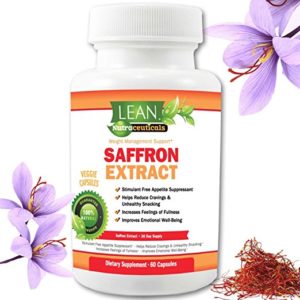
Lean Nutraceuticals has a pretty standard saffron supplement with the usual 88.5 mg dosage per capsule, but it’s not as well-reviewed as some of the other saffron supplements on the market.
Whether this is because of the extra ingredients included as binders and stabilizers or whether it is a quality control problem is hard to say, but users tend to have more success with other saffron supplements.
10. Wellbeing Formula Saffron
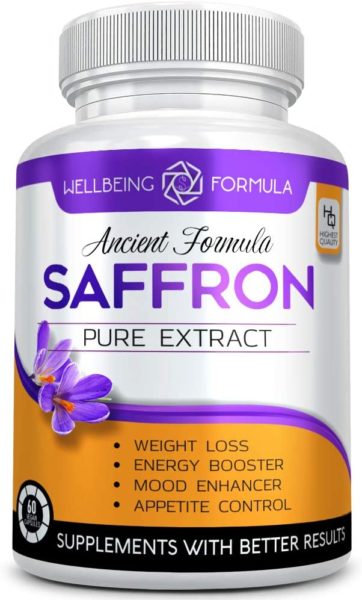
Wellbeing Formula provides a pretty standard saffron formulation. The capsules are vegan-friendly, but the biggest downside is that the safranal content is not explicitly stated. On higher-ranked supplements, you know exactly how much of the biologically active ingredient you’re getting, which is the main reason this supplement ends up at the bottom of the rankings.
Category winners
Best saffron overall: Saffron Super Spice + by Nuzena
Whether you’re looking for better cognitive function, a mood boost, or better sexual performance, chances are Nuzena’s Saffron Super Spice fits the bill. With an industry-spec 88.25 mg per serving and high purity standards, it’s easily the best all-purpose choice out there.
Best saffron for mental wellbeing: Saffron Super Spice + by Nuzena
Some of the strongest research on saffron is for improving conditions like depression and ADHD. It should be no surprise that our top overall pick, Nuzena, is also our recommendation for this category. Nuzena’s straightforward, high-dose formulation is perfect for mental wellness.
Best saffron for brain function: Life Extension Optimized Saffron
Life Extension’s Optimized Saffron is a great pick for sustaining brain health, especially in older adults, due to its standardized formulation. With their saffron extract standardized to exactly 0.3% safranal, you can be confident that you’re getting the right dose.
Best saffron for sexual wellness: Saffron Super Spice + by Nuzena
Saffron’s ability to improve libido in men and women, as well as to help with erectile dysfunction, has made it into one of the most exciting new sexual wellness supplements. Our pick in this category? Nuzena, thanks to its pure formulation and potent saffron content.
Best saffron for weight loss: Genius Diet Pills
For weight loss, saffron pairs very well with the other ingredients in Genius Diet Pills, like the neurotransmitter 5-HTP. This synergy makes Genius our top pick for a saffron-based supplement for weight loss.
Best saffron for concentration and focus: Life Extension Optimized Saffron
Looking to use saffron for a nootropic boost? We recommend Life Extension Optimized Saffron, for the same reasons that it’s our choice for overall cognitive health: purity, quality, and a precise, standardized dosage.
Who should buy saffron?
Saffron is a spice with a long history of use both in cooking and in medicine, but thanks to recent scientific advances, it is becoming increasingly popular as a supplement to treat low libido, erectile dysfunction, and depression, as well as a potential way to preserve your brain function as you get older.
Saffron is often used specifically as an adjunctive treatment or a supplementary part of treatment for depression, because some evidence suggests that it can combat one of the most common and most frustrating side effects of depression medication: sexual dysfunction, including a lack of desire and, in men, erectile dysfunction.
Selective serotonin reuptake inhibitors (SSRIs) and other depression medications are widely known for causing sexual dysfunction, so much so that many people want to stop taking them because of it (even if they are working for depression).
Saffron offers a potential alternative to stopping your medication, as long as your doctor approves of it. Saffron is also a popular natural remedy for depression in its own right. While it has not been subjected to the same scientific scrutiny as prescription medication for depression, research suggests that saffron may be able to boost levels of both dopamine and serotonin in your brain.
These neurotransmitters are both related to positive mood and indeed the function of SSRIs is to increase levels of dopamine in your body.
Saffron is a particularly good choice of a supplement for older adults, for several reasons. Not only do they tend to face higher rates of both depression and sexual dysfunction, but they are best-situated to benefit from any possible brain aging benefits that saffron offers.
Some of the most exciting new research on saffron has to do with cognitive function, and not just depression or sexual function.
Older adults can also benefit from the potential benefits of saffron on eye function, so older adults make up a strong additional group of people who may want to look into supplementation with saffron.
How we ranked
Research on the health benefits of saffron almost always starts with the raw plant material refined to either a set amount of saffron extract, or standardizing the dose to a specific concentration of safranal, which is thought to be the bioactive compound in saffron.
We used this research to guide our selection of saffron products. We required that any product on our rankings have at least 30 mg of saffron extract, which is the lowest dose of saffron that’s been successfully used in clinical research.
We preferred dosage levels that were easily scalable: 88.25 mg of saffron extract was the most common and one of the most convenient doses, since it’s on the high end of typical research doses, but is also small enough that you could potentially take a double dosage to come close to the highest doses that have been studied in research (circa 200 mg).
Saffron supplements that used a standardized dose of safranal generally scored higher in our rankings, all else equal, because you know that you’re getting a set dose of (potentially) the most important bioactive compound in saffron.
As with other natural supplements, taking the raw extract in supplement form involves a bit of guesswork, because the exact concentration of safranal will vary from plant to plant. Standardization helps take the guesswork out of the equation.
We had a slight preference for supplements that used a cellulose capsule as opposed to a gelatin capsule, to make our rankings a bit friendlier for vegetarians and vegans; however, gelatin was not a dealbreaker.
Purity and clean supplement design is important to us, so we reduced the score or even eliminated products that used binders and fillers like silicon dioxide. The very best products used a simple, natural capsule, with either no filler or something simple like rice flour.
After aggregating all of the remaining products and sorting according to overall quality, we had our final rankings of the best saffron supplements on shelves right now.
Benefits
Saffron has a wide range of health applications; it’s not just for cooking! While saffron was historically used as a medicinal remedy, dye, and cooking spice, it’s now the target of serious clinical research into its use as an antidepressant, immune system booster, appetite suppressant, and a treatment for sexual dysfunction.
This wide range of effects is impressive, especially considering the mechanism of action is not well-understood. While the biology of how saffron can improve your health and wellness are not known, the direct benefits have been researched fairly extensively.
Saffron can help treat erectile dysfunction. Saffron spice has long been rumored to be an aphrodisiac, but its use for sexual dysfunction wasn’t tested until fairly recently.
A study published in 2009 in the journal Phytomedicine described the initial results of a pilot study into saffron’s ability to help men with erectile dysfunction (1).
In the study, a group of twenty men took a 200 mg saffron supplement every day for ten days. By comparing metrics of erection strength and results from a questionnaire on erectile dysfunction, the researchers found a statistically significant improvement in symptoms.
This was only a pilot study, and it had no placebo group, but it provided some indication of saffron’s ability to help with sexual dysfunction.
Saffron can reverse the negative sexual side effects of antidepressants. A double-blind placebo-controlled clinical trial published in the journal Psychopharmacology in 2012 compared a 30 mg saffron supplementation routine to a placebo in a group of men who had been prescribed antidepressants and were suffering from sexual dysfunction as a side effect (2).
The researchers found that, after a month-long supplementation, the men taking the saffron supplement had significantly improved their erectile and sexual function compared to the placebo group. Consequently, saffron has also found itself in some testosterone boosters.
Saffron can be used by women with sexual dysfunction as well. Don’t think that the sexual health benefits of saffron are limited to men—similar research published in 2012 investigated the effects of saffron on women who had antidepressant-caused sexual dysfunction over a four-week period (3).
Similarly, the researchers found that, compared to a placebo, the saffron supplement resulted in improvement in a number of sexual health related measures.
This means that saffron likely affects something fundamental when it comes to sexual arousal and sexual function, which, as we’ll see, is in keeping with other evidence of its strong effects on the brain.
Saffron can be used to treat depression. In addition to being useful for treating some of the negative side effects of traditional selective serotonin reuptake inhibitors (SSRIs), saffron appears to be a useful treatment for depression in its own right.
A study published in 2014 by a team of researchers at Murdoch University in Australia reviewed the current state of the scientific literature with respect to saffron’s utility as an antidepressant (4).
The researchers evaluated six large, high-quality, placebo-controlled trials on saffron as a treatment for depression. They found that saffron had a significant effect on reducing symptoms of depression, and among the trials that compared saffron to a traditional antidepressant, the effects of saffron were comparable to the effects of the traditional antidepressants.
The researchers cited saffron’s ability to fight inflammation, upregulate serotonin production, and protect neural tissue as possible explanations for the strong observed effect.
Saffron can keep your dopamine and serotonin levels high. A review article in the Journal of Pharmacy and Pharmacology summarized the potential pharmaceutical applications of saffron and its extracts, noting that it had a strong effect on these two neurotransmitters in animal models (5).
Both serotonin and dopamine are critical to keeping your mood well-regulated, and indeed, these neurotransmitters are often targets of drug treatments for depression and anxiety. While further research is needed in humans, the clinical trials done thus far are very promising.
Saffron could protect your brain from aging. The strong antioxidant properties of saffron, combined with its clear benefit on the function of neurochemicals, led researchers to examine saffron’s ability to protect the brain as it ages.
One study by researchers at the University of Patras in Greece published in the journal Behavioral Brain Research used saffron as a neuroprotectant in aging mice (6).
The study involved giving mice a saffron supplement and studying their cognitive function, then correlating the results to levels of antioxidants in the brain.
The researchers found that the saffron supplement enhanced the cognitive function of the mice, and furthermore, that this enhancement was strongly related to the production of antioxidants in the brain.
Saffron’s antioxidant properties could fight back against cancerous cells. Though research so far has been confined to animal models and cell cultures, there is emerging evidence that the antioxidant properties of saffron could provide anti-cancer effects.
That’s according to a review article by Azam Bolhassani and other researchers in Iran (7). Their review cited numerous studies that showed that saffron and its extracts were able to regulate cell division, stop damage from free radicals, and modulating the effects of the immune system.
While there’s a lot more to be learned about how saffron interacts with cancer cells, this initial research is very promising.
Side effects
Saffron is largely well-tolerated among the clinical trials that have used it as a supplemental treatment thus far; in the scientific articles cited above, there were no major side effects noted.
Saffron as a plant material does have some side effects which could transfer to supplements as well. Exposure to large amounts of saffron has caused skin irritation, though this comes from reports of laborers who manually pick and dry the plant material (8).
They are undoubtedly exposed to a tremendous amount of saffron compared to the dosage usually encountered in a supplement, so it’s hard to connect this with any side effects you may experience.
One case report has also noted the (rare) possibility of developing a severe allergic reaction, like with any plant material (9).
Given that saffron has such wide ranging effects on your body, it’d be wise to consult with your doctor if you are taking any medication, as broad-spectrum supplements have a tendency to interact with some medications and cause unexpected side effects.
Recommended dose
The most effective clinical research studies on using saffron for medicinal purposes have employed doses ranging from 15 to 40 mg per day.
Occasionally these are divided into two doses, taken in the morning and the evening. Given that virtually all commercially available saffron supplements contain 88 mg of saffron per capsule, dosage should be pretty straightforward in most cases.
There’s a small handful of studies that have used higher doses (circa 200 mg per day), so if you aren’t getting the desired effects, you could try increasing your dosage to that level.
This higher dose appears to be effective for sexual dysfunction, so it may be that a higher dosage is necessary to reap these benefits.
FAQ
Q: Can a saffron supplement help your eyes?
A: For a long time, most of the research interest in saffron was focused on its mental health and sexual wellness benefits. New research is suggesting that saffron could benefit your eyesight, too, however.
Saffron may be effective at slowing the progress of age-related macular degeneration, or AMD, according to a study published in 2012 in the journal Evidence-Based Complementary and Alternative Medicine (10).
The study evaluated the effects of a saffron supplement on eyesight in a small group of people with macular degeneration. The study participants took a 20 mg per day saffron supplement for a year, during which their eyesight was assessed.
The results showed a significant improvement in eyesight throughout the course of treatment, though it is important to emphasize that this was an observational study with no control group.
The gold standard supplement for slowing or preventing macular degeneration is still taking an eye vitamin, which has high-quality placebo-controlled trials supporting their use.
Q: Is saffron a blood thinner?
A: Some preliminary data from animal studies, plus some circumstantial reports in clinical trials, suggested that saffron or one of its constituent compounds may increase bleeding time or affect blood coagulant properties.
These reports spurred a 2013 study that compared the effects of a placebo, a 200 mg daily saffron supplement, and a 400 mg daily saffron supplement on levels of blood clotting factors to uncover whether saffron could pose any risk of bleeding (11).
The study participants took their assigned supplement for seven days, during which the researchers studied the levels of several specific clotting factors in the blood. The results were clear: no effect of saffron on blood clotting ability, even at the extremely high dose of 400 mg per day. These results refute the claim that saffron could directly cause increased bleeding.
However, there is a possibility that saffron could interact with blood thinners like warfarin, which are known for their extensive potential interactions with other bioactive compounds, so if you are on any prescription medication, especially a blood thinner, you should talk to a doctor before starting a saffron supplementation routine.
Q: What is saffron useful for?
A: Saffron got its start as a natural treatment for depression, but its reputation expanded as more research increased the range of conditions that might be helped with saffron.
Saffron appears to have some influence on concentrations of both dopamine and serotonin, which are important neurotransmitters for maintaining a positive mood.
These benefits might also partially explain another area of saffron’s utility, which is its ability to increase sexual function and treat erectile dysfunction.
These first two applications are interrelated: saffron seems particularly useful for treating low libido or erectile dysfunction that are brought on by using medication to treat depression.
While these are the two most popular uses of saffron, newer research is suggesting that saffron could have additional benefits for older adults, including preserving brain function and eye function as you age. More research needs to be done on these applications, but they’re some of the most exciting frontiers in the uses of saffron.
Q: How do you eat saffron?
A: Saffron is easy to add to savory recipes, which reflects its traditional pairing with rice dishes. Usually, if you are working with raw saffron, you’ll need to expose it to hot or boiling water to extract the active compounds into your recipes.
Like with saffron tea, however, there’s a limitation to eating saffron in your diet: you don’t know the dosage you are getting. Even if you weigh out the amount of saffron you are using, it’s unclear how much of that will get extracted into your recipe, and what the concentration of biologically active compounds like safranal is in the raw saffron material.
So, while saffron is a great addition to your spice shelf, the best way to get the potential health benefits of saffron is probably by taking a supplement.
That way, you’ll have a precise, measured amount of saffron extract, particularly if your saffron supplement contains a standardized amount of safranal in each capsule.
Q: Does saffron have benefits for men?
A: Saffron is of particular interest to men because of research demonstrating a beneficial effect of saffron on sexual desire and erectile dysfunction. Multiple studies have found that saffron exerts a benefit on men’s sexual function, both with regards to sexual desire and performance, and with regards to erectile function (12,13).
Some (though not all) research has focused on men who are taking SSRIs for depression. Depression itself is known to cause erectile dysfunction and problems with sexual satisfaction, and this problem is compounded by the fact that one of the most common side effects of SSRIs is low libido and, in men, erectile dysfunction.
For men generally and men on SSRIs in particular, saffron is definitely worth a close look for its sexual health benefits.
Q: Does saffron have benefits for women too?
A: Yes, though saffron has been tested more extensively in men to treat sexual dysfunction, there is an emerging body of evidence that saffron could be useful for women, too.
As discussed earlier, one study has found that saffron can be beneficial for women who have sexual dysfunction related to taking SSRIs (14).
Additionally, research published in 2008 found that a saffron supplement could be an effective way to reduce the symptoms of premenstrual syndrome, particularly the mood disturbances related to PMS (15).
Q: How do you make saffron tea?
A: Saffron tea is surprisingly easy to make: all you need to do is bring water to a boil, add about 0.25 grams of saffron for every two cups of water, and mix in any additional flavoring sources you’d like before simmering for five minutes or so.
Many recipes for saffron tea call for cinnamon, ginger, lemon, mint, or sugar. For a carb-free option, consider using stevia instead of sugar.
The only downside with saffron tea is that you don’t have a good reference for exactly how much saffron you are getting, so it’s hard to compare a daily cup of saffron tea to a saffron supplement in terms of equivalent dosage.
Q: What is saffron extract?
A: Saffron extract is a standardized form of saffron that’s made by taking dried saffron spice and soaking it in a solvent—usually grain alcohol—and then evaporating the solvent.
The result is a highly concentrated mixture of many different potentially biologically active compounds in saffron. Many times, supplement manufacturers test for the concentration of a specific molecule called safranal.
Much like green tea extract is standardized using its ECGC content, saffron extract is standardized by safranal content.
This standardization is useful because not all saffron plants will have exactly the same concentration of the active ingredients. Once the concentration is standardized, the extract is usually pressed into capsules for use in saffron supplements.
Q: How long does it take to see the benefits of a saffron supplement?
A: Most research on the benefits of saffron involve following the study volunteers for around four to six weeks, so that’s an appropriate timeframe for assessing whether a saffron supplement is working for you.
Notably, a few studies on using saffron for increasing sexual desire and erectile function have been as short as ten or fourteen days and have found successful results.
These findings suggest that saffron may start improving sexual function very rapidly (i.e. within a few days or so). That’s great to hear if you’re frustrated with your sexual performance.
Nevertheless, if you’re not experiencing any negative effects, it’s worth waiting for up to a month and a half to evaluate whether saffron is giving you the kinds of benefits you are looking for.
Related articles
- Supplements for men
- Male enhancement pills
- Testosterone boosters
- Curcumin
- 5-HTP
- Nootropics
- St. John’s Wort
- Eye vitamins
Recap
Saffron is a versatile and powerful supplement with an impressive range of benefits. It can treat sexual dysfunction in both men and women, even when it’s a side effect of antidepressant drugs.
Saffron also appears to be an effective antidepressant in its own right, thanks to its ability to raise the levels of dopamine and serotonin in your brain.
This appears to make it comparable in efficacy to traditional selective serotonin reuptake inhibitors, or SSRIs, at least according to a few clinical trials.
Saffron also offers strong antioxidant effects, which might be able to protect the functioning of the brain as you get older, improving cognitive ability. Aside from rare cases of allergy to saffron plant material, saffron appears to be quite safe in terms of side effects.
Saffron supplements appear to work best at dosages of 30 to 200 mg, with the high end of the dosage perhaps only needed to treat sexual dysfunction.
There’s plenty of research currently underway that will expand our knowledge of how saffron can be used to improve health, but we already know that this ancient spice can have some very powerful health benefits.
For BodyNutrition‘s #1 saffron recommendation, click here.